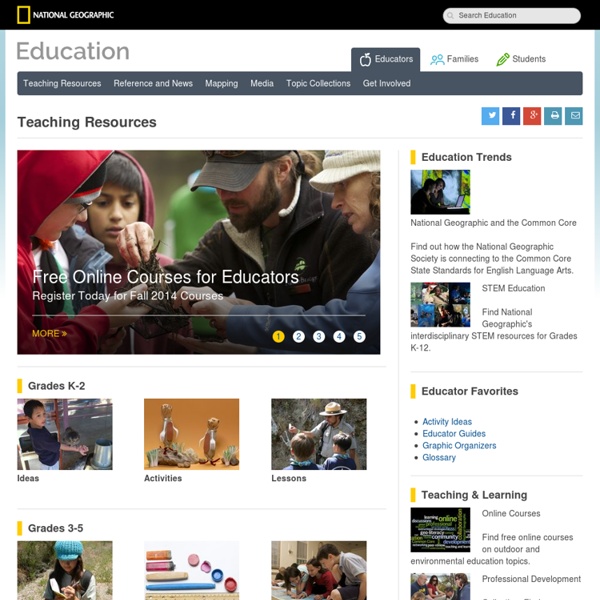physicscentral
Welcome to the Chemical Education Digital Library
» Biblioteca Innovación Educativa
¿Cómo puede un solo profesor atender, de forma personalizada, a un grupo numeroso de alumnos muy diferentes? ¿Cómo ganar tiempo para acompañar el progreso de cada alumno, a costa de la parte más expositiva de la clase? ¿Qué pasaría si esa parte se grabara en vídeo para verlo en casa, como tarea, y luego se dedicara la clase al trabajo directo con los alumnos? A partir de preguntas como estas nació la “clase al revés”, que nos propone “dar la vuelta” a la enseñanza tradicional y desplazar la atención del docente al alumno y su aprendizaje. El alumno estudia en casa, a su propio ritmo, y el profesor dedica el tiempo de clase a atender dudas, generar dinámicas participativas y ofrecer a los alumnos la oportunidad de acercarse a los contenidos de la manera más acorde con su forma personal de aprender. De este modo se favorece una educación más personalizada, a la medida de las necesidades de cada alumno. Jonathan Bergmann es profesor de Ciencias en Estados Unidos. Los autores Robert J.
Stellarium
Edheads - Activate Your Mind!
BioEd Online: Biology Teacher Resources, Lesson Plans
is pleased to offer a new online series of podcasts and supplementary standards-based educational activities, research information, and links. National Space Biomedical Research Institute (NSBRI) researcher, Dr. Babs Soller of the University of Massachusetts Medical School, has been working to develop techniques for non-invasive measurement of blood and tissue chemistry. Her work can be used to help monitor the health of astronauts in space. National Space Biomedical Research Institute (NSBRI) scientist Scott Dulchavsky has developed a technique to train space flight crews to conduct medical-quality ultrasound imaging in space. David Dinges, a professor at the University of Pennsylvania School of Medicine, is working with the National Space Biomedical Research Institute (NSBRI) to develop a test that helps astronauts to gauge fatigue and stress during long missions in space.
ScienceDaily: News, Videos & Articles in Science, Health, Technology & Environment
Lawrence Hall of Science - 24/7 Science
How fast does the wind blow? What makes things sticky? Where do insects live and plants grow? So many questions—and so many ways to find answers! Bridge Builders How Fast Is the Wind Gooo! Filling Without Spilling Parachute Drop Crystals Bird Beaks Sticky Situations Oil Spill How Old is Your Penny? Measure Yourself Where Do Plants Grow? Bug Hunt! Afterschool KidzScience AfterSchool KidzScience™ kits are designed specifically for children in grades 3 - 5 in out-of-school settings. Check Out Science Check Out Science makes doing science with your family easy, no scientific expertise necessary. Explore Your World You don't have to trek through a rainforest, blast off for space, or dive to the deep sea to explore your world. Roadside Heritage Roadside Heritage is an informal science educational project with its origins in the stunning landscape of the Eastern Sierra along the 395 scenic byway. Save Sam! Green Milk Save Ratty Virus Worker Nano Puzzle How Small is Small What is an SEM? Mr.
Explorer's Guide
The PEEP and the Big Wide World Explorer's Guide, designed for early childhood classrooms, invites children and teachers to explore science in the world around them. Six units offer hands-on explorations that lead to rich science learning as well as lots of fun. Each unit features an animated PEEP story and related live-action video clips in both English and Spanish. Family Science letters — also in English and Spanish — encourage families to continue the exploration and learning at home. (PDF files can be viewed and printed using the free Adobe Reader.) Family Science Letters – 2MB PDF Share simple ideas for science play at home, along with recommended books and online activities. Introduction – 403KB PDF Welcome to the PEEP Explorer's Guide. Preschool Science: The PEEP Approach – 478KB PDF Learn about the PEEP approach to preschool science. Explore Shadows Outdoors, make shadows in the sunlight. Explore Water Explore Plants Indoors, plant seeds and bulbs and track their growth. Explore Color
The Case Files Online Exhibit Homepage | The Franklin Institute's Resources for Science Learning
This presentation of The Franklin Institute's Case Files highlights individuals from the history of science and technology. It is one of many Resources for Science Learning. Each thematic group of Files presented at left begins with commentary from a distinguished historian of the discipline. About The Case Files The Franklin Institute's Case Files are a unique repository in the history of science and exist as the documentary record of The Franklin Awards program which, since 1824, has recognized outstanding scientific achievement, across all scientific disciplines. Within each Case File is a story, waiting to be told, of scientific enterprise and social circumstances. Likewise, the Institute's annual Awards Week program is a vibrant celebration of scientific enterprise and the scientists at its forefront. About the Committee onScience and the Arts The Franklin Institute's Committee on Science and the Arts (CSA) oversees the Awards program and maintains the Case Files. For K-12 Teachers
Freebies for Science Teachers
GeneEd Added: Jul 14, 2017 Revisit the National Library of Medicine’s GeneEd for new resources. Targeted primarily for high school students and teachers, the website offers genetics education resources organized by Topics, Labs, Teacher Resources, Career Information, and Highlights (news). Recent additions to the Topics page include articles, interactive tutorials, and teacher resources for exploring the role of genetics in influencing behavior and identity and for exploring precision medicine and pharmacogenomics. To access the new materials, click on the Topics tab, go to Top Issues in Genetics, and select the links Genetics, Behavior and Identity, or Precision Medicine.
NSDL.org - National Science Digital Library



